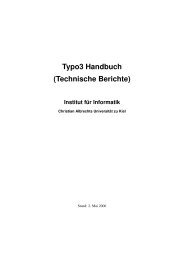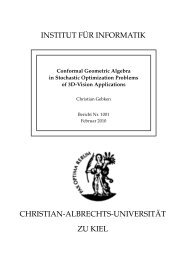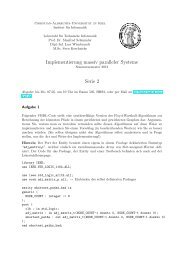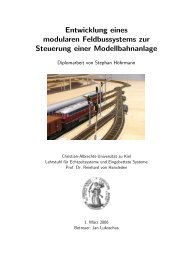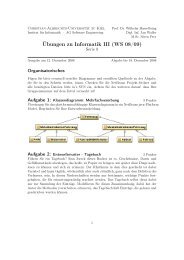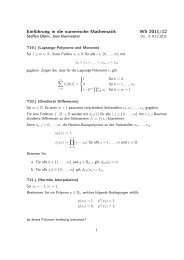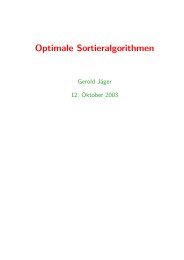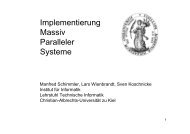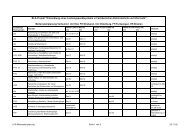Curry: An Integrated Functional Logic Language
Curry: An Integrated Functional Logic Language
Curry: An Integrated Functional Logic Language
You also want an ePaper? Increase the reach of your titles
YUMPU automatically turns print PDFs into web optimized ePapers that Google loves.
Intuitively, a function f declared as a choice function behaves as follows. A call to f is evaluated<br />
as usual (with a fair evaluation of disjunctive alternatives, which is important here!) but with the<br />
following differences:<br />
1. No free variable of this function call is bound (i.e., this function call and all its subcalls are<br />
considered as rigid).<br />
2. If one rule for f matches and its guard is entailed (i.e., satisfiable without binding goal<br />
variables), all other alternatives for evaluating this call are ignored.<br />
This means that the first applicable rule for this function call (after pattern matching and guard<br />
checking) is taken and all other alternatives are discarded.<br />
As an example, consider the non-deterministic function merge for the fair merge of two lists:<br />
merge :: [a] -> [a] -> [a]<br />
merge eval choice<br />
merge [] l2 = l2<br />
merge l1 [] = l1<br />
merge (e:r) l2 = e : merge r l2<br />
merge l1 (e:r) = e : merge l1 r<br />
Due to the choice annotation, a call to merge is reducible if one of the input lists is known to be<br />
empty or non-empty (but it is not reducible of both inputs are unknown). Thus, merge can also<br />
merge partially unknown lists which are incrementally instantiated during computation.<br />
<strong>An</strong>other application of the choice annotation is a fair evaluation of disjunctive search goals.<br />
For instance, the following function takes a search goal and computes one result (if it exists) for<br />
the search variable in a fair manner, i.e., possible infinite computation branches in a disjunction do<br />
not inhibit the computation of a solution in another branch:<br />
tryone :: (a->Success) -> a<br />
tryone eval choice<br />
tryone g | g x = x where x free<br />
Note that functions containing choice expressions may be indeterministic in contrast to other userdefined<br />
functions, i.e., identical calls may lead to different answers at different times. This is similar<br />
to non-deterministic functions which can be given a declarative semantics [18]. The difference to<br />
non-deterministic functions is that only one result is computed for functions declared with choice<br />
instead of all results. As a consequence, the completeness result for <strong>Curry</strong>’s operational semantics<br />
[23] does not hold in the presence of the evaluation annotation choice. Since indeterministic functions<br />
are mainly used in the coordination level of concurrent applications (as in parallel functional<br />
computation models [11, 12]), this is a only minor problem. A programming environment for <strong>Curry</strong><br />
could classify the indeterministic functions in a program.<br />
9 Interface to External Functions and Constraint Solvers<br />
Since <strong>Curry</strong> has only a small number of builtins, it provides a simple interface to connect external<br />
functions (functions programmed in another language) and external constraint solvers. External<br />
34



